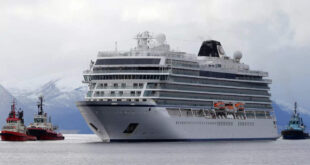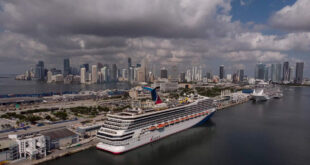[ad_1]

Despite the pandemic-induced slowdown, the cruise activity is rebounding impressively, confirmed Joel Katz, the Managing Director of the Cruise Lines International Association (CLIA) for Australasia & Asia.
He said that the global cruise capacity is forecast to grow 19 per cent in the coming years, with about 40 million cruise passengers predicted annually by 2028.
“The CLIA cruise members are making significant investments, totaling approximately USD 40 billion in new ships and cutting-edge technologies. Within the next five years, the industry plans to deliver an impressive fleet of 60 new ships, boasting not only innovation and efficiency to enhance the traveler experience but also integrating environmentally sustainable technology. As a result of these advancements, the global cruise capacity is projected to witness a remarkable growth of 19 per cent in the coming years,” he added.
This year, the anticipated global cruise passenger numbers are expected to reach between 27 to 33 million, contributing significantly to the global economy with an estimated total economic impact of approximately USD 155 billion. Katz said that this surge in activity is set to support around 1.2 million jobs, generating wages amounting to approximately USD 50 billion, returning to levels seen in 2019.
“While the cruise industry‘s contribution remains a relatively small percentage of global tourism, it marks a significant growth trajectory for the sector and presents immense opportunities for various destinations,” he added.
Encouragingly, cruise tourism is gradually rebounding and approaching pre-pandemic levels, offering a positive outlook for the industry’s revival and sustainability here, plays a greater role, Katz added.
Amid this growth, the cruise industry is facing the imperative of embracing sustainability to reduce emissions. Katz emphasised that sustainability is the single greatest challenge confronting the industry, and achieving net-zero carbon cruising is of paramount importance. To address this, the industry is actively pursuing three core approaches.
“Firstly, the decarbonisation of ships’ emissions involves testing new technologies and alternative marine fuels to drastically reduce emissions both at sea and in ports. Cruise liners worldwide are replacing older vessels with more efficient and sustainable ones, leading to significant emissions reductions. Investments in new technologies and alternative fuels, including biofuels, are also on the rise,” Katz said.
Approximately, 15 per cent of cruise ships to be delivered in the next five years will be equipped to use sustainable fuels.
CLIA has recently joined the global maritime forum’s call to action for shipping decarbonisation as a supporting organisation, signaling the industry’s commitment to a greener future.
Secondly, Katz emphasised that the industry has a strong emphasis on reducing waste, implementing circular economies, and advancing waste management and advanced wastewater treatment systems on new ships.
“Sustainable destination stewardship is another priority, where cruise industry stakeholders are working closely with local communities to promote sustainable tourism practices that benefit both the environment and residents. The UN World Tourism Organization‘s definition of sustainable tourism serves as a guiding principle, emphasising economic well-being, cultural preservation, and environmental protection,” Katz added.
The cruise industry including CLIA members are also forging partnerships with governments, ports, and communities worldwide to address sustainability challenges effectively.
“In successful cruise tourism destinations, a partnership approach is vital, emphasising the importance of having a comprehensive cruise strategy. This strategy encompasses various aspects, such as building suitable infrastructure, implementing appropriate regulatory measures, and collaborating with the broader tourism sector,” explained Katz.
In addition to focusing on sustainability, the cruise industry is witnessing a positive shift in consumer sentiment. As per CLIA’s research, travellers are increasingly making travel decisions based on environmental considerations, with 50 per cent of current and potential cruise travellers expressing greater commitment to sustainable travel over the past three years.
Regarding future forecasts, Katz shared positive news, indicating that the intent to cruise is higher than it was in December 2019, reflecting a trend that began in late 2020. “An overwhelming 85 per cent of travellers who have cruised expressed the willingness to cruise again, showcasing confidence in the industry’s recovery and growth potential.”
In another notable trend, all sizes of ships continue to be popular among travellers, with approximately one-third of ships now being developed as small, one-third as medium-sized, and another one-third as larger vessels, each having distinct infrastructure requirements.
Moreover, the value of using a travel agent is also being recognised by cruise travellers, as it provides an encouraging sign for travel agent partners who play a crucial role in facilitating cruise travel experiences, shared Katz.
Katz also commended the resilience and unity displayed by the cruise community, including cruise lines, suppliers, cruise boards/ associations, and destinations, during the challenging times of the past few years. He expressed optimism that the industry is now stronger than ever and poised to face the future with confidence, driven by technology, investments, and a commitment to environmental sustainability and destination stewardship.
“With innovation, investment, and collaboration, the industry is poised to lead the way in green cruising, making positive contributions to the decarbonisation of shipping worldwide,” he concluded.
CLIA is the largest cruise industry trade association, representing over 90 per cent of the world’s ocean-going cruise capacity, with 300 ocean vessels, about 54,000 travel agents, and 15,000 travel agencies.
With a mission to advocate, educate, and promote the shared interests of the cruise community, CLIA supports policies and practices that ensure a secure, healthy, and sustainable cruise ship environment, providing positive travel experiences for over 30 million passengers annually.
Headquartered in Washington, DC, CLIA operates globally with regional offices in North and South America, Europe, Asia, and Australasia.
[ad_2]
Source link






